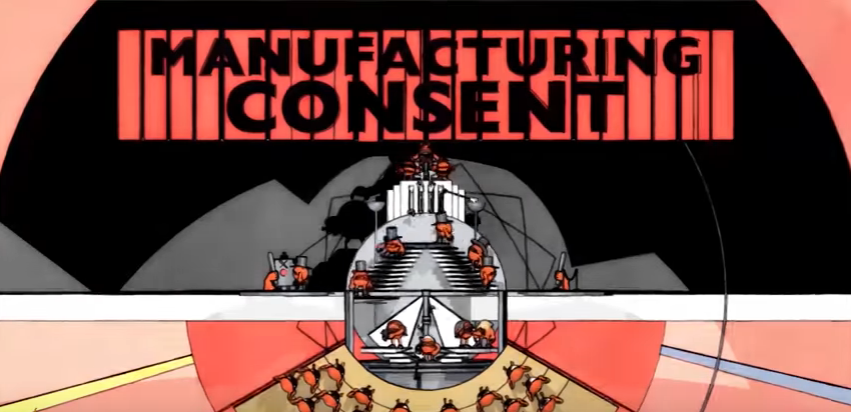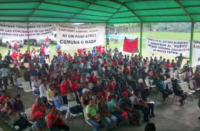To the Marxist it is indisputable that a revolution is impossible without a revolutionary situation; furthermore, it is not every revolutionary situation that leads to revolution. What, generally speaking, are the symptoms of a revolutionary situation? We shall certainly not be mistaken if we indicate the following three major symptoms: (1) when it is impossible for the ruling classes to maintain their rule without any change; when there is a crisis, in one form or another, among the “upper classes”, a crisis in the policy of the ruling class, leading to a fissure through which the discontent and indignation of the oppressed classes burst forth. For a revolution to take place, it is usually insufficient for “the lower classes not to want” to live in the old way; it is also necessary that “the upper classes should be unable” to live in the old way; (2) when the suffering and want of the oppressed classes have grown more acute than usual; (3) when, as a consequence of the above causes, there is a considerable increase in the activity of the masses, who uncomplainingly allow themselves to be robbed in “peace time”, but, in turbulent times, are drawn both by all the circumstances of the crisis and by the “upper classes” themselves into independent historical action. – V. I. Lenin ‘The Collapse of the Second International’
This article on challenging ruling class hegemony in order to convert the crisis of capitalism into a revolution starts with a lengthy but important quote from Lenin defining a revolutionary situation as both the conditions of the ruling class no longer being able to govern and the oppressed and exploited class being alive with demands incapable of being solved by the ruling class. In this sense, a revolutionary situation is a dialectic between both the ruling class and the working class. An objective crisis of capitalism in and of itself is not sufficient, as we saw in the wake of 2008. That there is an objective crisis of capitalism is evidenced by the overall declining rate of growth globally since the ‘60s and the growing existential metabolic rift between capital and the environment. Slowing growth, defined as the increased reproduction of capital, is occurring despite new markets opened up, vast privatisation, technology increasing the rate of exploitation, permanent arms build-up and a vast, pointless and growing advertising/sales industry. Indeed, many of these solutions to declining growth exacerbate the second element of the crisis which is now threatening the planetary future.
Yet, as Gramsci theorised, the ruling capitalist class continues to have consent from the oppressed and exploited to its rule and governance. Recent election results here in the South attest to this fact with only 50% participating and there clearly being majority support for ruling class parties. As our Party Statement said of these elections, the results “showed the continuing strength and stability of bourgeois ideology in Irish society.” So, despite objective crisis there is no revolutionary situation, as the ruling class continues with the consent, active or passive, of a majority to govern and so “solutions” to crises continue down the same paths that benefit the few while further exacerbating the many elements of the objective crisis of capitalism. Despite capitalism being in crisis, it is able to continue and the ruling class rule through its favoured means – consent – without having to revert, just yet, to its alternative form of rule through coercion: fascism.
Sociologist Michael Burroway, in Manufacturing Consent: Changes in the labour process under monopoly capitalism, shed light on consent when looking at why workers work as hard as they do in the workplace. Why do they consent to increased exploitation? He argued that workers’ submission to ever increasing demands at work is more due to ideological consent rather than disciplinary/economic coercion. Increasingly sophisticated HR and communication strategies by employers and the internal competition for promotion effectively lead to workers either “playing the game” for self-advancement or withdrawing from the process and clocking in and out or going sick. Consent, however, is not absolute and class struggle exists in workplaces often manifesting itself in union struggles over wages and for collective bargaining. However, collective bargaining itself can be seen as both class struggle and a form of consent when the goal is merely a larger slice of the value created as opposed to ownership itself.
These insights appear useful to understanding society more generally where some workers play the game and vote hoping to see some marginal returns for their interests (or that of their “identity” or group) but not seeking to challenge the overall system itself, while others just withdraw. Ideological consent in society, as Herman and Chomsky expertly outlined in a similarly titled book, Manufacturing Consent: The Political Economy of the Mass Media, is achieved through sophisticated media, information and communication strategies that reinforce existing power structures and limit or restrict perceived solutions or choices. Ideological consent allows for the preferred method of liberal democratic governance where coercion (fascism) exists as a threat but less often invoked as a necessity.
In this context, “solutions” to the many crises in front of us are reduced to “realistic” options, often the well-trodden paths of privatisation, financialisation, intensified use of technology, the creation of new markets and things of this nature. These are to be delivered by our existing governing parties who can be trusted and relied upon as the mature centre ground of politics, and if you vote for them you probably will get some of the scraps of the table or some small temporary advantage out of it, maybe a tax cut or increased funding, etc. However, it doesn’t have to be this way. In moments of critical juncture when the crisis of capitalism is most obvious and the ruling class is scrambling to continue to govern, then a coherent alternative path can be presented and may be chosen by workers, thus creating a revolutionary situation, as Lenin described.
The Communist Party, in Ireland, has not played the role as a mass popular Party and is unlikely to do so in the near future. Instead, we have always influenced events through ideas and a dedicated cadre of activists. So, our best strategy now, as outlined in our Congress document, is to committedly build a broad counter-hegemonic Popular Front that both critiques existing power and relations but also presents transformative demands that create a new path for workers to choose at critical junctures.






